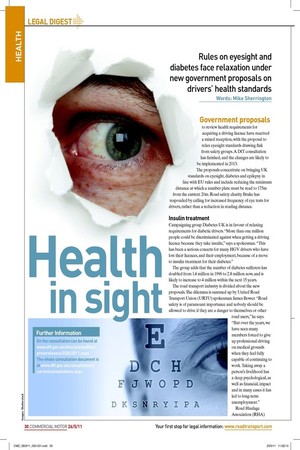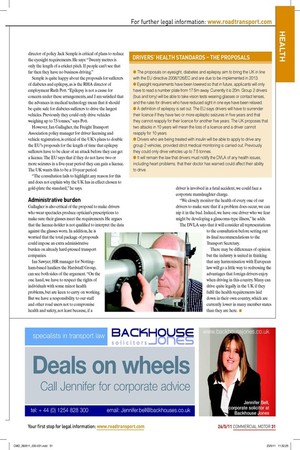ealth
Page 22

Page 23

If you've noticed an error in this article please click here to report it so we can fix it.
in sight
Rules on eyesight and diabetes face relaxation under new government proposals on drivers’ health standards
Words: Mike Sherrington
Government proposals
to review health requirements for acquiring a driving licence have received a mixed reception, with the proposal to relax eyesight standards drawing lak from safety groups. A DfT consultation has inished, and the changes are likely to be implemented in 2013.
The proposals concentrate on bringing UK standards on eyesight, diabetes and epilepsy in line with EU rules and include reducing the minimum distance at which a number plate must be read to 17.5m from the current 20m. Road safety charity Brake has responded by calling for increased frequency of eye tests for drivers, rather than a reduction in reading distance.
Insulin treatment
Campaigning group Diabetes UK is in favour of relaxing requirements for diabetic drivers. “More than one million people could be discriminated against when getting a driving licence because they take insulin,” says a spokesman. “This has been a serious concern for many HGV drivers who have lost their licences, and their employment, because of a move to insulin treatment for their diabetes.” The group adds that the number of diabetes sufferers has doubled from 1.4 million in 1996 to 2.8 million now, and is likely to increase to 4 million within the next 15 years.
The road transport industry is divided about the new proposals. The dilemma is summed up by United Road Transport Union (URTU) spokesman James Bower. “Road safety is of paramount importance and nobody should be allowed to drive if they are a danger to themselves or other road users,” he says. “But over the years, we have seen many members forced to give up professional driving on medical grounds when they feel fully capable of continuing to work. Taking away a person’s livelihood has a deep psychological, as well as inancial, impact and in many cases it has led to long-term unemployment.” Road Haulage Association (RHA) director of policy Jack Semple is critical of plans to reduce the eyesight requirements. He says: “Twenty metres is only the length of a cricket pitch. If people can’t see that far then they have no business driving.” Semple is quite happy about the proposals for sufferers of diabetes and epilepsy, as is the RHA director of employment Ruth Pott. “Epilepsy is not a cause for concern under these arrangements, and I am satisied that the advances in medical technology mean that it should be quite safe for diabetes sufferers to drive the largest vehicles. Previously they could only drive vehicles weighing up to 7.5 tonnes,” says Pott.
However, Ian Gallagher, the Freight Transport Association policy manager for driver licensing and vehicle registration, is critical of the UK’s plans to double the EU’s proposals for the length of time that epilepsy sufferers have to be clear of an attack before they can get a licence. The EU says that if they do not have two or more seizures in a ive-year period they can gain a licence. The UK wants this to be a 10-year period.
“The consultation fails to highlight any reason for this and does not explain why the UK has in effect chosen to gold-plate the standard,” he says.
Administrative burden
Gallagher is also critical of the proposal to make drivers who wear spectacles produce optician’s prescriptions to make sure their glasses meet the requirements. He argues that the licence-holder is not qualiied to interpret the data against the glasses worn. In addition, he is worried that the total package of proposals could impose an extra administrative burden on already hard-pressed transport companies.
Ian Sawyer, HR manager for Nottingham-based hauliers the Hardstaff Group, can see both sides of the argument. “On the one hand, we have to respect the rights of individuals with some minor health problems, but are keen to carry on working. But we have a responsibility to our staff and other road users not to compromise health and safety, not least because, if a
HJ Strip advertDeals on wheels:B
driver is involved in a fatal accident, we could face a corporate manslaughter charge.
“We closely monitor the health of every one of our drivers to make sure that if a problem does occur, we can nip it in the bud. Indeed, we have one driver who we fear might be developing a glaucoma-type illness,” he adds.
The DVLA says that it will consider all representations to the consultation before setting out its inal recommendations to the Transport Secretary.
There may be differences of opinion but the industry is united in thinking that any harmonisation with European law will go a little way to redressing the advantages that foreign drivers enjoy when driving in this country. Many can drive quite legally in the UK if they fulil the health requirements laid down in their own country, which are currently lower in many member states than they are here. ■












































